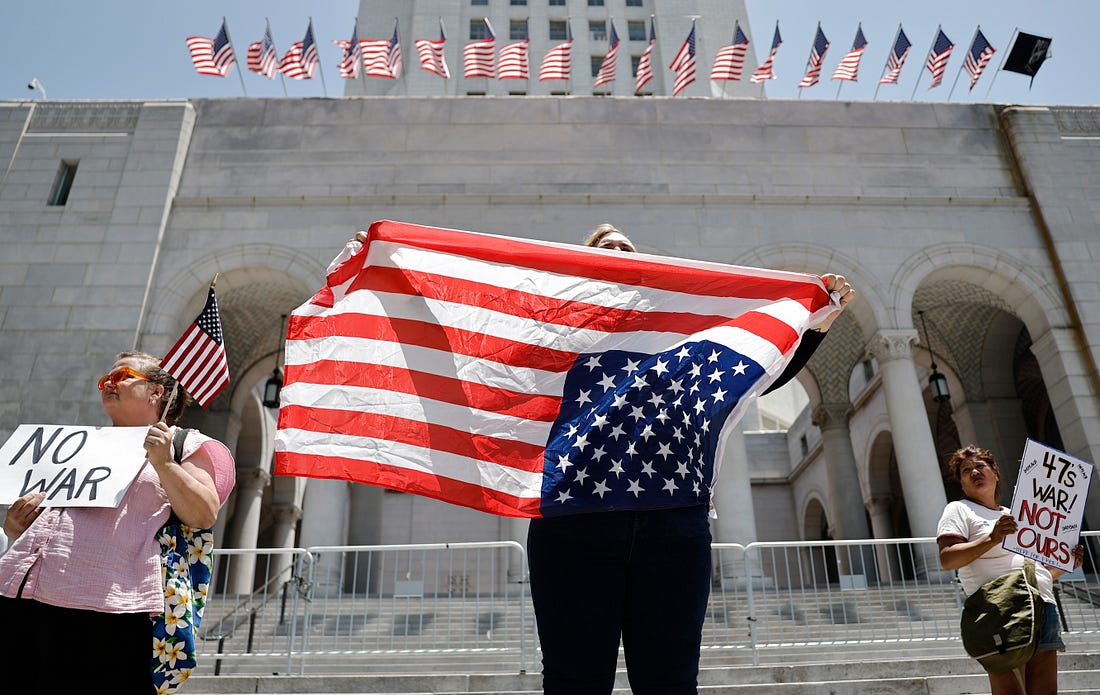|
 |
The Public Is Resisting Trump. The Elites Aren’t.
The president is encountering little resistance as he remakes our society. And yet polling is clear that voters aren’t with him.
Back in April, the White House took a sledgehammer to America’s trading relationships with the rest of the world, pledging that a shiny new trade regime would be in place within three months: “90 deals in 90 days.” Seventy-five days and two deals later, they’re tweaking the calendar a bit.
“Secretary Lutnick said yesterday that he expects 10 more deals,” Treasury Secretary Scott Bessent told Fox Business this morning. “So, if we can ink 10 or 12 of the important 18, there are another important 20 relationships, then I think we could have trade wrapped up by Labor Day.” Happy Friday.
The Public’s Not With Trump
by William Kristol
In case you hadn’t noticed, everything’s not great as we approach the celebration of our nation’s 249th birthday.
Donald Trump’s abuses get more brazen and his usurpations get more dramatic by the day. He is tightening his control of the executive branch and using its powers ever more aggressively to execute his authoritarian agenda. The other two branches of government don’t seem able or willing to do much to check or balance him, or even slow him down. And much of the private sector is too timid to embrace the cause of defending liberty and a free society.
Things could be worse. They’d be worse if the American people were enthusiastically supporting Trump’s actions. But they’re not. That might make the inability or unwillingness of their “leaders” to resist Trump more forcefully seem inexplicable. But there is also hope that with the public resisting, these leaders might eventually stiffen their spines a bit.
There’s some fresh evidence of public resistance in a new poll from Quinnipiac University. It shows 41 percent of voters approving of the way Trump is handling his job as president, while 54 percent disapprove.
More striking is this: On Trump’s signature issue of immigration and deportation—central in so many ways to his authoritarian project—64 percent of voters say they would prefer giving most undocumented immigrants a pathway to legal status, while only 31 percent say they prefer deporting most of them. In December 2024, those numbers were 55 percent versus 36 percent. So Trump has lost ground on his most high-profile initiative.
What’s more, 56 percent of respondents in the Quinnipiac poll disapprove of the way ICE is doing its job, 55 percent disapprove of sending National Guard troops to Los Angeles, and 60 percent disapprove of sending in the Marines. Again, cause for optimism but also befuddlement, too. After all: Couldn’t Democrats in Congress do more to point out that the “One Big Beautiful Bill” now before the Senate massively increases spending for the unpopular masked men of ICE and their deportation efforts?
Then again, maybe making this point is unnecessary. The Quinnipiac poll shows that the Big Beautiful Bill is already extraordinarily unpopular. An unusually high 71 percent of respondents say they have heard or read a lot (36 percent) or some (35 percent) about that legislation. And they don't like it. Fifty-five percent of voters oppose the bill while only 29 percent support it, and 16 percent are unsure or have no opinion.
I can recall no similar case when the signature legislation of a new president and his party in Congress had the support of only 29 percent of the public. Even Democrats in Disarray should be able to run successfully in 2026 against Republican members of Congress who’ve voted for this bill—and more broadly, against the Republican leadership in D.C. that insisted on it.
It’s true that there are limits to how effective mere public disapproval can be in stopping an authoritarian push by a powerful executive. Presidents have a lot of power even if much of the public isn’t supportive. Still, if the public were on board, things would be worse.
But you know what would help a lot? Some elite disapproval—publicly and boldly expressed. While a successful democracy depends on some degree of reasonableness from voters, a successful liberal democracy also depends on some degree of responsibility and even courage from elites.
Next week will provide a case study of elite responsibility and courage. As Jefferson put it in his famous letter to Roger Weightman expressing regret that he wouldn’t be able to attend a celebration of the Declaration’s 50th anniversary:
I should indeed, with peculiar delight, have met and exchanged there, congratulations personally, with the small band, the remnant of that host of worthies, who joined with us, on that day, in the bold and doubtful election we were to make, for our country, between submission, or the sword; and to have enjoyed with them the consolatory fact that our fellow citizens, after half a century of experience and prosperity, continue to approve the choice we made.
Jefferson took pride in being one of the “small band,” the “host of worthies” who made their momentous choice and chose to approve the Declaration on July 4, 1776. They did so, of course, as representatives of their fellow citizens, who (mostly) approved of their choice then and later. But Jefferson’s letter is a reminder that the Declaration was a choice not at first of the people but of the signers. They were elites who individually pledged not to the people but “to each other” their lives, fortunes, and sacred honor.
Is it too much to hope that we might find similar worthies willing to make such a choice today?
